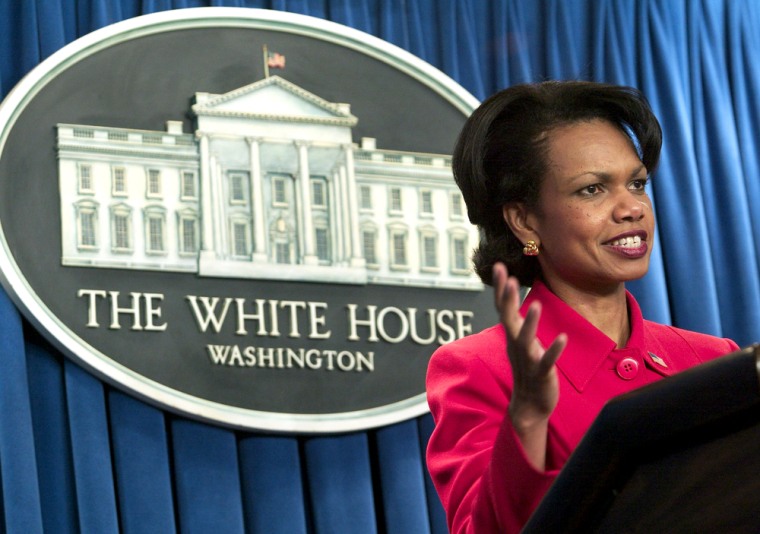The federal panel reviewing the Sept. 11 attacks has scheduled interviews with former President Clinton and former Vice President Al Gore this month but is struggling to get similar cooperation from President Bush and other administration officials.
Members of the bipartisan commission said they were considering a subpoena to force the public testimony of national security adviser Condoleezza Rice, who has declined to appear at the panel’s two-day hearing later this month.
“The commission wants to go back in the court of public opinion and appeal to the administration for them to reconsider their first stand,” said commissioner Timothy Roemer, a former Democratic congressman from Indiana. “If we don’t get that kind of cooperation, compelling Dr. Rice to come before us is an option.”
The 10-member commission also requested private meetings with Bush and Vice President Dick Cheney about what the administration knew before the attacks, potentially a sensitive subject in an election year.
Bush, Cheney agree to one-hour private sessions
While Clinton and Gore have consented to public questioning without a time constraint, Bush and Cheney have agreed only to private, separate, one-hour meetings with the commission’s chairman and vice chairman, instead of the full panel.
The commission was meeting Tuesday to discuss options as it seeks to hold private interviews with the four officials before its next hearing. The interviews with Clinton and Gore were scheduled for “the next couple of weeks,” the commission said.
The latest dispute comes as the panel seeks additional time from Congress to complete its work. House Speaker Dennis Hastert, R-Ill., agreed Friday to support extending the panel’s deadline to July 26, clearing the way for Congress to formally approve legislation this week. The panel was scheduled to finish its work on May 27.
The commission and its supporters wanted a two-month extension of both dates, but met resistance among House GOP leaders, partly because of concern that a final report would get entangled with presidential election politics.
Hastert’s proposal would not give the commission any time to wind down its business, a period during which commissioners lobby for implementation of their recommendations on how to prevent future terror attacks and declassify information for public release.
Negotiations continue over deadline extension
A congressional inquiry into the Sept. 11 attacks took seven months to declassify information, a process that involves White House approval. Under the current deadline, the commission has a 60-day period to wind down. The Senate bill would give it just 30 days.
The chairman and vice chairman of the commission, former New Jersey Republican Gov. Thomas Kean and former Rep. Lee Hamilton, D-Ind., planned to meet separately with Hastert on Tuesday to push for a longer wind-down period.
“We’re very hopeful that we can find a way with the House bill and the Senate bill to come together,” said commission spokesman Al Felzenberg.
At the panel’s next hearing on counterterrorism policy, Defense Secretary Donald Rumsfeld and Secretary of State Colin Powell are to testify, as well as their counterparts in the Clinton administration, William Cohen and Madeleine Albright.
Clinton’s national security adviser, Sandy Berger, also is to appear at that open session, which commission officials say will be unprecedented in its review of high-level officials in Clinton and Bush administrations.
Rice testified privately
Rice met with the panel for four hours at the White House on Feb. 7. After the session, at least two commissioners, Roemer and Richard Ben-Venister, another Democrat, said it would be useful to have Rice testify in public.
Relatives of Sept. 11 victims say they are especially interested in Rice’s testimony. They cited her May 2002 comments that the administration had no prior indication that terrorists were considering suicide hijackings. Reports later showed that intelligence officials had considered the possibility.
Congress established the Sept. 11 panel — officially known as the National Commission on Terrorist Attacks Upon the United States — to study the nation’s preparedness before the attacks and its response afterward, and to make recommendations for guarding against similar disasters.
